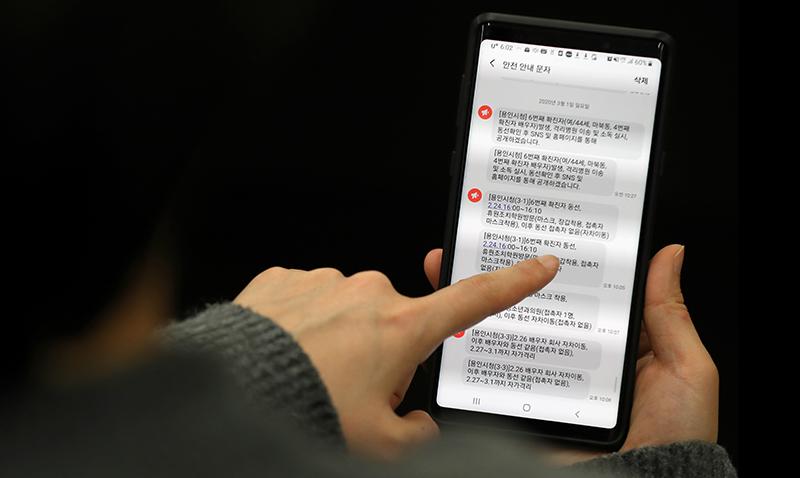
The central and local governments are quickly sending emergency alerts on areas hit by the COVID-19 outbreak. This photo taken on March 5 shows text messages sent to residents of Yongin, Gyeonggi-do Province, from the city's municipal government since the first confirmed case was reported there on Feb. 21. (Kim Sunjoo)
By Song Baleun and Kim Minji
The central and local governments are sending daily real-time alerts on the number of confirmed cases of COVID-19 and the travel histories of those infected via text messages and information posted on websites.
The Central Disaster and Safety Countermeasure Headquarters under the Korean Centers for Disease Control and Prevention also holds two briefings per day on the situation.
The transparent and swift provision of this information has allowed the development of mobile apps and websites easing public access to such data, something that has consequently helped stem the spread of COVID-19.
Launched on Feb. 11, Corona 100m (Co100) is Korea's most popular mobile app related to the outbreak. It alerts users when they come within 100 meters of a spot visited by an infected person.
Boasting a million downloads in its first ten days after launch, the app allows users to conveniently avoid potentially dangerous locations without checking the travel histories of those infected.
Among websites, Coronamap (https://coronamap.site/) shows the travel histories of confirmed COVID-19 patients and Coronaita (https://coronaita.com/#/) provides information on coronavirus-hit areas like a search engine.
In addition to providing information on COVID-19, the government is also informing the public about protective masks sold through public channels amid the nationwide shortage of masks.
The Ministry of Science and ICT on March 10 said data on protective masks sold to the public comes out daily at 7 p.m. It added that the government's provision of needed information to the public and people developing services reflecting practical demand for the given data have formed a model of public-private cooperation.
Data on protective masks sold through public channels are being jointly provided by the ministry, the Ministry of the Interior and Safety, the Ministry of Health and Welfare, and small and medium venture companies through an open application programming interface provided by the cloud service of the Korean web portal Naver.
brightsong@korea.kr